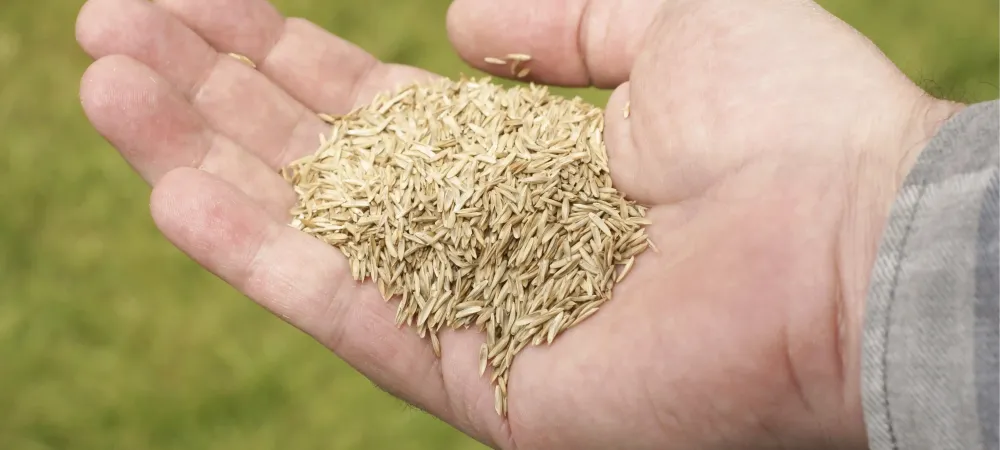How Long Does it Take Grass Seed to Grow?

Planting grass seed is one of the most effective ways to improve a thin or patchy lawn, but patience is key. If you're reseeding in West Michigan, local climate and soil conditions will play a big role in how fast your lawn fills in. So, how long does it actually take grass seed to grow here?
Let’s break it down by grass type, weather, and care practices to help you understand what to expect.
How Long Does It Take for Grass Seed to Germinate?
Grass seed germination typically takes 5 to 21 days, depending on the seed variety and environmental conditions.
In West Michigan, most homeowners use cool-season grasses like tall fescue, Kentucky bluegrass, or perennial ryegrass. Here's how long each typically takes to sprout:
- Perennial Ryegrass: 5–10 days
- Tall Fescue: 7–14 days
- Kentucky Bluegrass: 14–21 days
These timelines refer to germination only, meaning when the seed begins to sprout. It may take an additional 3 to 6 weeks before the grass is strong enough to handle mowing or foot traffic.
What’s the Best Time to Plant Grass Seed in West Michigan?
In this region, early fall (late August to early October) is ideal for seeding. The combination of warm soil, cooler air, and more frequent rainfall creates perfect germination conditions.
Spring (mid-April to early June) is another option, but may require more watering and weed control due to competition from crabgrass and other aggressive species.
Tip: Avoid summer seeding. High heat and dry soil can lead to poor germination and weak root development.
Factors That Affect How Fast Grass Seed Grows
Even the best seed won't grow well without the right conditions. Several factors influence how quickly your lawn will fill in:
- Soil Temperature: Cool-season grasses germinate best between 50°F and 65°F soil temps.
- Moisture: Consistent watering is essential. Soil should stay moist—but not soaked—during the first 2–3 weeks.
- Seed-to-Soil Contact: If the seed isn’t pressed into the soil properly, it may dry out or wash away.
- Weed Pressure: Competing weeds can slow or block new grass growth, especially in spring.
- Fertilization: Starter fertilizer helps provide nutrients essential for strong early root development.
What to Expect Week by Week
If you're monitoring growth after planting, here's a general timeline to follow:
- Week 1: Some ryegrass may begin sprouting, especially in warm, moist conditions.
- Week 2–3: Fescue and ryegrass will fill in. Kentucky bluegrass may just begin to appear.
- Week 4–6: Lawn begins to thicken. First mowing may be possible once grass reaches 3–4 inches.
- Week 6–8: Most cool-season lawns are established enough for light use and continued care.
Why Your Grass Seed Might Not Be Growing
If your grass seed isn’t germinating after two or three weeks, a few issues might be to blame:
- Poor watering schedule (either too dry or too soggy)
- Old or low-quality seed
- Excessive shade or foot traffic
- Soil compaction or poor seed contact
- Temperature outside the ideal germination range
Testing your soil and overseeding in the right season can help avoid many of these problems.
Get Help with Lawn Seeding in West Michigan
Whether you're filling in bare spots or starting fresh, knowing when and how fast grass will grow is just the beginning. Seeding success depends on local knowledge, timing, and proper follow-up care, especially in West Michigan’s fluctuating climate.
If you’re unsure about the best approach for your lawn, a local lawn care company like ours can recommend the right seed blend and ensure proper application. A little guidance goes a long way toward getting the thick, healthy lawn you're aiming for. Contact us today to get a custom service plan and get the est out of your lawn!
